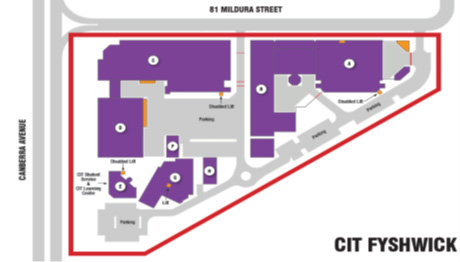Smoke Free Policy
1. Purpose
To provide a safe and supportive work culture and study environment that promotes positive healthy lifestyle choices for staff, students and visitors which is free from the harmful effects of both active and passive smoking. To impose smoking bans including the use of electronic cigarettes (e-cigarettes) or any other tobacco product through eliminating the risk of exposure and to encourage smokers to quit or reduce their consumption.
2. Scope
This CIT Smoke Free Environment Policy applies to all CIT staff, students, contractors, clients, visitors and community members at all campuses including CIT owned Student Accommodations. The policy also applies to students or staff engaged in off-campus activities where smoking and vaping is also banned by law such as outdoor eating and drinking areas, at underage music/dance functions and in cars when children under the age of 16 years are present, at public transport waiting areas, public play spaces and when inside CIT vehicles. For further information see the Smoke-Free Public Places Act 2003, the Smoking in Cars with Children (Prohibition) Act 2011, the Smoke-Free Public Places (Public Transport Stations) Declaration 2017, the Smoke-Free Public Places (Public Transport Stops) Declaration 2017and the Smoke-Free Public Places (Play spaces) Declaration 2016.
3. Principles
3.1 CIT recognises that the health, safety and welfare of its staff, students, contractors, visitors and community members are of primary importance and will ensure that all practicable means are applied to ensure a smoke-free environment.
3.2 Staff, students, contractors, visitors and community members are required to remove themselves beyond the boundary of a CIT campus in order to smoke or vape (see definition of smoke and vape below in 5. Definitions).
3.3 The smoking of illicit substances is prohibited on CIT grounds and vehicles including CIT owned student accommodation facilities.
3.4 CIT managers and supervisors will ensure that staff, students, contractors, visitors and community members are aware of and comply with this policy. Where non-compliance occurs, they should direct the person to cease smoking immediately.
3.5 CIT managers and staff have a duty or care to manage risk and if they are aware of another staff member, student, contractor, visitor or community member who is in breach of this policy they should request the person to cease immediately.
3.6 In case of non-compliance with this policy by CIT staff, CIT staff may be investigated for misconduct which may result in disciplinary action as provided for in the relevant enterprise agreement.
3.7 In case of non-compliance with this policy by CIT students, they may be investigated for a breach of the CIT Student Code of Conduct and Student Conduct Policy.
4. Documentation
Work Health and Safety Act 2011
Smoking in Cars with Children (Prohibition) Act 2011
Smoke-Free Public Places Act 2003
Magistrates Court (Litter Infringement Notices) Regulation 2004
Work Health and Safety Regulations 2011
AS/NZS ISO 31000:2009 Risk Management - Principles and Guidelines
ACTPS Non-Executive Passenger and Light Commercial Vehicle Management Guidelines
ACTPS Alcohol and other drugs policy
5. Definitions
| Smoke | Direct inhalation or puffing of smoke of an ignited substance prepared for human consumption including a substance containing a drug, tobacco, herb or other plant matter. For this definition of smoke, a person directly inhales if the smoke through a device designed for the inhalation of smoke; and holding or having control over such a substance while it is ignited. |
| Boundary | The designated boundary that contains CIT premises and buildings. Smoking is only permitted outside these boundaries. |
| Environmental Tobacco Smoke (ETS) | Also known as passive smoking, occurs from breathing in other people’s tobacco smoke. ETS contains over 4000 chemical compounds including 43 known carcinogens. Means a mixture of chemicals and particles released into the air whenever someone smokes a cigarette. ETS comes from the burning end of a device designed for the inhalation of smoke by a smoker and from the smoke exhaled by a smoker, referring to a combination of the following:
|
| Electronic Cigarette, or e-cigarette | This is a handheld electronic device used to simulate the experience of smoking of a cigarette. It may be referred to by other names such as a Juul, e-cigar, e-pipe, vape pen, hookah pen, e-hookah, vape pod kit, starter kit or vape tank. |
| Carcinogens | Are substances that increase the risk of abnormal growth or tissue in humans or in animals. |
| Contractors | In this policy, means any individual, corporation, partnership or association, institution or other entity that is the party to supply materials or labour through an agreement or consultancy process to the Institute. |
| Cigarette | A small roll of finely cut tobacco for smoking, enclosed in a wrapper of thin paper; and A similar roll of another substance, such as a tobacco substitute or prohibited drug. |
| Cigarette butt litter | Waste or remnants from discarded cigarettes deposited at a place other than the appropriate receptacle provided. |
| litter | Litter includes any solid or liquid waste, whether domestic or commercial, and also includes, for example –
|
| Officers | In CIT the following positions have been identified as officers; Chief Executive, Executives, College Directors. However other individuals within CIT may also be considered Officers. An Officer can also be a person who makes, or participates in making decisions that affect the whole or a substantial part, of business or undertaking of the Territory. |
| Passive Smoking | Means the involuntary inhalation of ETS. |
| Personal Vaporiser | Is any device that is made for the purpose, or apparent purpose, of delivering a substance into a person’s body when the person inhales through the device. It excludes therapeutic and medical devices such as Ventolin inhalers or oxygen delivery devices. |
| Persons conducting Business of Undertaking (PCBU) | Person conducting a Business or Undertaking has the primary duty of care in relation to health and safety of workers. A “person” is defined in laws dealing with interpretation of legislation to include a body corporate (company), unincorporated body or association and a partnership. Accordingly, CIT is identified as the PCBU. |
| Tobacco | Includes any of various plants of the genus Nicotiana, especially N. tabacum, native to tropical America and widely cultivated for their leaves, which are used primarily for smoking. These leaves are dried and processed chiefly for use in cigarettes, cigars, or other smoking devices. |
| Vape or Vaping | To smoke an e-cigarette. |
| Worker | Means an individual who carries out work in relation to a business or undertaking, whether for reward or otherwise, under the arrangement with the person conducting the business or undertaking. |
6. Policy Contact Officer
For more information about this policy contact the CIT Workplace, Health and Safety Team (WorkplaceHealth-Safety@cit.edu.au).
Contact CIT Student Services on (02) 6207 3188 or email infoline@cit.edu.au for further information.
7. Procedures
Guidelines
This policy extends smoking restriction to the places outlined by the boundary (red line below) in order that all staff, students, contractors, visitors and community members whilst at CIT are protected from the hazards of tobacco and vaping smoke.


| POLICY INFORMATION |
|
Policy No: 2016/2169 Approved: October 2024 Next Review: October 2027 Category: Student policies, Staff policies, Corporate policies Policy Owner: Executive Director, Corporate Services |
| POLICY SEARCH |
| POLICY RESOURCES |
| Browse Policies CIT Definition of Terms CIT Governance Framework (PDF 381Kb) Complaints Form Client Service Charter (PDF 845Kb) Student Code of Conduct (PDF 286Kb) |
| POLICIES LAST UPDATED |
|
07 Jan 2026: Assessment Policy 18 Dec 2025: Privacy Policy 18 Dec 2025: Smoke Free Policy 18 Dec 2025: Workplace Health and Safety Arrangements Policy 09 Oct 2025: Training and Assessment Strategy (TAS) Development Policy |

